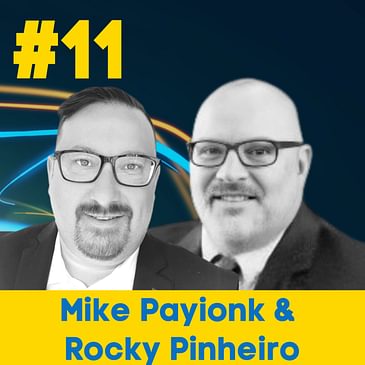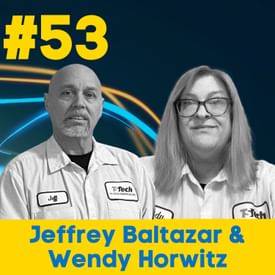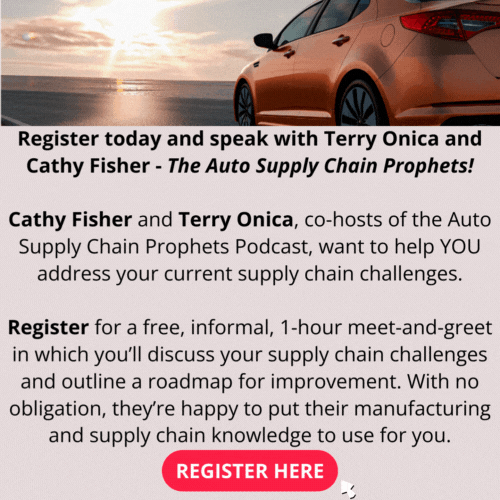As self-proclaimed “quality nerds,” Rocky Pinheiro and Mike Payionk of fastening solutions manufacturer PennEngineering speak about quality with exactly what nerd implies — passion, expertise, and arcane knowledge.
Rocky, who holds a Ph.D. in management, spent 25 years in manufacturing before arriving at PennEngineering. Most of his career was in the automotive industry, including 13 years at various iterations of Fiat Chrysler.
A Michigan native, Mike grew up surrounded by automotive manufacturing. Like Rocky, he spent most of the past two decades working in the industry with a focus on quality control.
Rocky and Mike love to geek out on data, which they use to help manufacturing plants operate at a higher level. In this episode, they discuss the key role automation plays in making it all possible, as well as their unique style of facilitating interdepartmental communication.
Themes discussed in this episode:
- How to sell the idea of automation to client organizations that may be initially reluctant to adopt it
- Rocky and Mike’s “U.N. diplomat” approach to communication and how they use it to break down silos
- How automating their quality management system helped create a plant-level system for employees to step right into after COVID
- Rocky and Mike’s “industry 4.0 journey” toward goals of improving technology and data gathering
- Why automotive supply chain leaders need to acknowledge their blind spots to help improve quality issues
Featured Guests:
Name: Rocky Pinheiro
Title: Global Vice President of Quality, PennEngineering
What he does: Rocky ensures that organizational communication is ongoing and transparent between silos at PennEngineering, which is a decentralized organization. An auto industry veteran, he credits a brief stint working to implement lean methodology at Detroit Medical Center for his customer-centric approach.
Connect: Linkedin
Name: Mike Payionk
Title: Quality Control Program Manager, PennEngineering
What he does: Mike manages PennEngineering’s Enterprise Quality Management System and is a stakeholder for its supplier onboarding and management. Also an automotive industry veteran, he helps ensure best practices are consistent in PennEngineering’s 11 manufacturing plants across the globe.
Connect: LinkedIn
Episode Highlights
Timestamped inflection points from the show
[1:45] Forged in steel: PennEngineering’s Rocky Pinheiro is a quality expert with over 25 years of experience in heavy manufacturing, the bulk of it in the automotive industry. He spent 13 years at Fiat Chrysler.
[3:20] Early exposure: Rocky’s colleague Mike Payionk also represents a wealth of experience in automotive manufacturing, with the better part of two decades spent in quality control.
[4:53] Same process, different applications: Automation is crucial to PennEngineering’s work. It provides critical lead time to supply automotive clients, who have very specific deadlines, processes, and systems for manufacturing their products. Consumer electronics clients rely on automation to shorten the time it takes to develop the initial versions of their products from ideation to build.
[5:53] The buy-in: Automation must be implemented in order to work. Rocky says end users must be involved and invested in the automation process from the very beginning.
[7:16] Key automation category: Automating the CAPA (Corrective and Preventive Action) system made the most dramatic difference for Rocky and Mike’s team, in terms of automating nonconformances data. “It felt like overnight we went from not understanding what was happening on the plant floor to completely understanding what was happening on the plant floor,” Mike says.
[10:26] Clear communication, hard data: Automation enabled one of the firm’s biggest wins: For the first time, PennEngineering used true quantitative processes to illustrate the performance levels of businesses that are often small and family-owned.
[13:54] Ruthless, yet diplomatic: Rocky calls the team’s approach to communication — specifically to breaking down silos and pulling team members around the world into organization-wide discussions — “ruthless.” But he says it’s also a “U.N. diplomat approach.”
[15:21] Work-in-progress: Rocky and Mike are about a year into what they call their “industry 4.0 journey,” a project campaign with two functional goals: improving technology around manufacturing processes and improving data gathering with a dashboard format that communicates new findings at both plant and executive levels.
[17:03] The one thing: To convince an organization to transition from spreadsheets to automation, first identify its pain points. Then connect the company to a provider that’s going to treat it (and you) like true partners, Rocky says.
[19:32] The one thing: Mike says continuously collecting data is essential to helping companies improve their quality issues, even if they’re still using spreadsheets.
Top quotes
[5:53] Rocky: “The most important thing we’ve learned [about selling automation to end-users] is involving the end user upfront. You have to get the buy-in upfront. Without end-user input and end-user buy-in, you will fail. I don’t care how good the tool is or how invested or energetic your top-of-the-house is. If the end-users are not buying what you’re selling, you’re going to fail.”
[7:33] Mike: “As we started to automate [our CAPA system], it really captured what was happening on the plant floor, what was happening in a global aspect, all that information. It felt like overnight, we went from not understanding what was happening on the plant floor to completely understanding what was happening on the plant floor.”
[13:21] Mike: “We were already trying to connect our plants globally via one system before COVID was even a thing. After, it just kind of flowed … and we had normal usage.”
[13:51] Rocky: “Silo — that is a four-letter word for sure. We are ruthless in communication. We're like disruptors in our world. We take this ‘U.N. diplomat’ approach of … getting [people] involved in a lot of communication, bringing people into the team, and having conversations around what we want to do and how we want to do it. And getting their input and getting their feedback. Because we run a decentralized model in our company, we are dealing with all kinds of timezones. That's another hurdle that we need to get over. It's really just building that team and that collaborative environment that has allowed us to get that horizontal-ness into the silo mentality that we have, and we do have that as an organization for sure.”
[19:34] The One Thing: Mike: “Just keep collecting the data. That’s what we did. Whether you’re collecting it with a spreadsheet, or you have a system, or you're trying to implement a system, you cannot fix the problems with half the data.”
[20:27] The One Thing: Rocky: “Admit that you have blind spots that need to be worked on. If you come at it from too big of a prideful stance, then you're going to continue to have the problems.”
We really can't predict the future because nobody can. What we can do though, is help auto manufacturers recognize, prepare for in profit from whatever comes next. Auto Supply Chain Prophets gives you timely and relevant insights and best practices from industry leaders. It's all about what's happening now in the automotive supply chain and how to prepare your organization for the future. Because the auto supply chain is where the money is.
Jan Griffiths:Hello, and welcome to another episode of auto supply chain profits. In this episode, we'll talk about automation, getting data at our fingertips, and data dashboards. We all want these things but how do you get it and we're gonna find out? We're gonna meet Rocky Pinero and Mike Payionk. And, they are self confessed quality nerds, ruthless communicators, and level five leaders. And let's not forget in this episode, we're going to talk about that four letter word that we love to hate. Yes, silos! Rocky and Mike, welcome to the show.
Rocky:Hey, thanks for having us, Jan.
Mike:Thanks. We're excited to be here.
Jan Griffiths:Okay, let's get right in, shall we? Rocky, what's your story?
Rocky:I am a California dairy kid. Transported to Michigan about 30 years ago for my wife, she tricked me with the nice weather and the greenery. And then I hit my first winter and realize maybe I made a mistake. But that was 30 years ago. So I would say no. 25 plus years and manufacturing. Everything from the OEM level to the tier level, lean quality, heavy manufacturing, automotive manufacturing, spent over 13 years with the various iterations of FCA. So great learning experience there. Spent a few years in health care, Detroit Medical Center doing Lean and quality work there, worked with some just amazing people. A lot of my formation of customer approach came from the DMC and just really take a customer approach, customer focus and level five leadership approach to what I do.
Jan Griffiths:When you say level five leadership for our audience. Could you elaborate on that?
Rocky:Yeah. So there's a concept called level five leadership. Collins was the author, he did a study in the early 2000s, focusing on 11 leaders in industry in their businesses performed at four times the s&p average. And what he found is they all had extremely similar traits. The primary aspects of those traits were an aspect of humility, and serving others, even at the CEO level, and they were all CEOs in these companies. So that's something that I just felt it was really important to do. It's not always easy to do. But I found that it's it served me well, as I've adopted that.
Jan Griffiths:Authentic leadership at its finest. Mike, what is your story?
Mike:Unlike Rocky, I am born and raised here in Michigan. So I'm very familiar with automotive systems, and kind of grew up with that kind of manufacturing. I've been in the manufacturing business for about 20 years. And for the majority of that has always been in the quality side of it. So I'd say probably 17 to 18 years, has been in the quality either working early on as a quality engineer or quality lead or some type of quality. Over the years, I've worked in quite a few different manufacturing plants, and they're in their quality groups. I did have a small stint in the early 2000 10s. For a company called United solar, they made solar panels still worked in quality. So we applied the same methodologies that automotive groups would as well. So and currently I've been with current company here for the better part of eight years. And yeah, it's been great.
Cathy Fisher:So Rocky and Mike, tell us a little bit about from your experience, how important automating processes today is compared to your experience in the past?
Rocky:In our business, we have multiple customers with multiple demands as it pertains to timing turnaround time, things of that nature. On the automotive side, those customers are very specific in terms of when something is due. They allow us a lot of time for development. So definitely automation is important in the lead time from start to finish of a process. The customer, electronics side or consumer electronics side They're very interested in the time to development, so time to get something to the initial shipping. So in that sense, automating our processes upfront, in terms of developing ideation, taking things from ideation into to build is important. So really the use of automation tools is important, but in to kind of separate applications.
Terry Onica:So how did you go about automating your quality processes and getting people on board to join in, in the automation process as well?
Rocky:What a heavy lifting in the beginning. Mike can definitely weigh in on that one, because it's been a big part of his focus almost for four plus years. Now, Mike, I would say the most important thing we've learned is involving the end user upfront, you have to get the buy in upfront without in user input. And in user buying, you will fail. I don't care how good the tool is, or how much invested or energetic here your top of the house is, if the end users are not buying what you're selling, you're going to fail. So Mike, obviously, you can get into the nuts and bolts much better than I can.
Mike:So I would totally agree when you have them buy into this new method. Because like you said before, Terry, you know, a lot of these users are using spreadsheets, or they're using some outmoded technology. So as we start to bring in new technology, and capture that data to Rocky's point, as long as they're bought in, and I think the biggest part of that is understanding what we're doing, and developing like a discovery before we even launch, understanding what their needs are, what solution this is going to apply to, and then launching that I hope, once they buy in it does it spreads like wildfire.
Cathy Fisher:Mike, which tier quality processes would you prioritize as the first, or most important to automate?
Mike:So for us, I think the most important was probably our kappa system. As we look at our nonconformances, and automating some of that data. As we looked across the enterprise, when we launched, we had X amount of plants doing it X amount of ways, everybody kind of did it their own separate way. So as we started to automate those processes, it really captured what was happening on the plant floor, what was happening in a global aspect, all that information. So it was, I don't want to say overnight, but it's it felt like overnight, we went from not understanding what was happening on the plant floor, to completely understanding what was happening on the plant floor. As far as both internal issues, external issues of supplier based issues. All that data was now at our fingertips.
Cathy Fisher:And it sounds like two by automating or moving towards automation. It kind of gives you almost the excuse for getting everybody on the same page using the same process. Yes?
Mike:Oh, absolutely. Like I said, having these multiple locations, and multiple avenues of data collection or processes, bringing one system in and having an automated now standardized everything, right. So I know that plant A is doing it the same way as Plan B is doing it the same way as Plant C. Now they might have some things that are customized for each plant. But at the end of the day, it's easy to translate that data and say, okay, you know, XYZ is the same as 123, you know, at these two different plants.
Terry Onica:When it comes to your suppliers, what are you doing in that area?
Mike:Currently, we're tracking all of our suppliers through our automated QMS system. We're keeping track of their contacts, their addresses, websites, certifications, things like that, what products or commodities they supply to us. And then we're wrapping that into our kappa system. As we see things come in either through incoming inspection or late deliveries or supply chain issues. We're issuing scars out to them, then that's automating our process almost using our QMS as a portal for them to log in. And it's automating our response time from them or a response from them.
Terry Onica:What's been the early results as you've gone through automation, what have you seen as far as benefits to the organization?
Mike:It's a..you can't all just having that data at your fingertips, you know? It's changed completely how we interact with ourselves as customers and vendors. Plant A in the US might supply to Plant B in Europe, and they're both customer slash vendor to each other. So they're in our vendor or supplier module, and we're issuing scars and we're seeing that data, and then they're rolling it up into their kappa system which is also our system in running corrective action tools. And so everybody's kind of doing it the same way.
Rocky:I would just to add to that, obviously, we're being the quality nerds that we are, we use a lot of acronyms, so apologize to any listeners who "What's a SCAR?". So that's the supplier corrective action request or Kappas, the corrective and preventive action system. But one of the really big wins for us in the supplier usage and driving it down to our suppliers at the tier level that we're at, although we are at tier one, and to the automotive industry. Generally, we're a tier two or tier three. And traditionally, our level of tier has not communicated very well, with our suppliers. We haven't scored them, we haven't communicated to them using really quantitative processes, in terms of their performance. So it's been a really good benefit. Initially, it's been a pain point for some of them, because these are very small family owned businesses that we're dealing with. So that's been a learning process for them. But at the same time, we feel it's very important, because at the end of the day, the OEMs and their requirements, they just keep getting heavier and heavier as they should. I think COVID really even troll that even further, when the world turned itself back on, people weren't ready. And that's because at the tier two and below level, there wasn't a lot of communication going on in terms of "Are you ready?", the communication didn't happen. So it was like this slinky, that got broken pretty abruptly.
Cathy Fisher:I wanted to mention that I feel like COVID was a tremendous opportunity, a kind of a litmus test for the robustness of organizations, quality management systems. Because without that, the procedures and the standard ways of operating. When people came back into the workplace, they were probably lost. And there was a lot of new people that were coming in, because not everybody came back as well. How has your automation of your quality management system really helped you since COVID,
Rocky:I would say for for us initially, it helped to create a standard in the plants. So a system for people to step into. I'm a big systems person and a big standardization person. You know, we have 14 locations, on multiple continents, speaking multiple languages. So it was easy for us to turn the key, open the door and turn machines back on and follow the prescriptive processes that we had in place because we had spent four plus years putting the system in place. So we were immediately able to track how we were doing to measure to know that we were ready to go. And without that hard work again, a lot of it done by Mike, we wouldn't have been able to do that.
Mike:Like what Rocky was saying is, you know, I would say it didn't not affect us. I mean, COVID affected everybody. But we were already putting things in place. For something like this, like something like this to happen. We were already trying to connect our plants globally, via one system before COVID was even a thing. So yeah, after it just kind of flowed right into it. And we had normal usage. Once people got back into plants and they started kicking plants back off, we were definitely back to getting that data.
Terry Onica:So Rocky, often we find that a lot of organizations that quality and supply chain are siloed. How do you break the silos in your organization so that they're working together as one and not separately?
Rocky:Oh, man, Silo, that is a four letter word for sure. We are ruthless in communication. Mike and I are we're like disruptors in our world. For me, my approach is we call it the UN diplomat. So we take this UN diplomat approach of asking people and getting them involved in a lot of communication. And bringing people into the team and having conversations around what we want to do and how we want to do it and and getting their input in their feedback. Because we run a decentralized model in our company, are dealing with all kinds of timezones, that's another hurdle that we need to get over. So it's really just building that team in that collaborative environment that has allowed us to get that horizontalness into the silo mentality that we have. And we do have that as an organization for sure.
Mike:In addition, I'd like to point out we do have great groups of people so we definitely have the we've always done it this way. There's there's definitely been that. But we also have the kind of staff that they're forward thinking they know if it's a good solution and it's it works then But they might give us a hard time about it. But at the end of the day, they understand that this is for them that it's, it's for us as a company. And then they usually usually come along.
Cathy Fisher:What's next for your organization in terms of automating your processes?
Rocky:Right now, we are actively in a project campaign that we've been, I'd say about 12 months into this journey on our industry 4.0 journey. And we're doing really two functional things. One is looking at improving the technology around our manufacturing processes. And the other is improving the process with which we capture data, and bring that data into a dashboard type of format, that communicates both to the plant level and to the, to the corporate level, if you will, or the leadership level. So we're doing those things simultaneously, one to deal with capacity, and our ability to continue to grow. We're very lucky, that pin engineering, in that we have grown organically, quite well, and are forecasted to continue to do so. So we have to improve the processes get into more automation, just really better the equipment that we're using, and at the same time, capture that data to know quicker when to respond, if there's an issue to control and contain quality, close to the point of manufacture and not just inspect things downstream. We need to get out of that waste environment. So those are the two things that we're focusing on. And those are the two things that I'm responsible for. And the corporation right now.
Terry Onica:For our listeners out there that are really want to get off the spreadsheets and want to have an automated QMS system like you have, what recommendations would you give them on how to sell this to the organization?
Rocky:I would say first find out what they believe their pain points are, so that you're not working on something that they don't want or that they don't feel as value added for them. And then look, for a provider that's truly going to treat you like a partner, and not just a customer, that's going to write them a check. Because it's going to be a journey, and you better be patient. Because it is not a light switch, it's gonna take some time, it's probably somewhat worse than an ERP implementation. Because with an ERP implementation, there's a lot of the organization that's affected. So everyone's kind of vested in it. With a QMS implementation, there's a percentage of the organization that's impacted, but you're pulling data from a lot of the organization, and they may not want to know what's going on in their world, or wants you to know what's going on in the world. So you have to be careful of how you're doing it.
Cathy Fisher:Rocky, what are your thoughts on bringing together supply chain and quality those functions in the organization to have, let's say better transparency about the interactions between those aspects of the business?
Rocky:Yeah with the best supply chain wins. So, involving them and working in concert is key. I know that's maybe kind of a squishy answer. But I've always found that because I've been at the OEM level. And now that I met a lower level tier, I definitely see the importance on both sides. So I take that approach with our suppliers in terms of clear communication and what's expected. And again, treating them like a partner and not just treating them like somebody who's delivering a good or service.
Terry Onica:That's one thing that Cathy and I have heard from a lot of our guests that I'm so happy to hear about is that OEMs and suppliers are getting much better at collaborating and working together than they have in the past. And I think that's been one really good thing out of COVID.
Jan Griffiths:Hey, Mike, question for you. What is the one piece of advice, the one thing that you would tell supply chain leaders out there in the automotive industry today something that they could grab onto that's actionable that they could start doing right away? That would help them on their journey?
Mike:I would say just keep collecting the data. That's what we did. We whether you're collecting it with a spreadsheet, or you have a system or you're trying to implement a system, you know, you cannot fix the problems with half the data. So that's what we're trying to do. We're trying to see what data we have, who's got the worst quality issues or who has poor delivery or a combination of both. And we're trying to work with them to better themselves as a corporation or as a company so that we can grow, so that they can grow. So I would say just keep collecting the data and work on that relationship with them.
Jan Griffiths:So, stay the course with the data. Yeah, I love that. Rocky, what's your one piece of advice? The one thing that supply chain leaders could take away today and start working on?
Rocky:I would say, admit that you have blind spots that need to be worked on. If you come at it from too big of a prideful stance, then you're gonna continue to have the problems.
Jan Griffiths:Yeah, so don't be complacent. Excellent. Okay. Well, Mike and Rocky, thank you very much for joining us today.
Rocky:Thank you, Jan. Appreciate it.
Mike:Yeah. Thank you, everybody. Thanks for having us on.
Dietrich:Are you ready to find the money in your supply chain? Visit www.autosupplychainprophets.com To learn how, or click the link in the show notes below.




